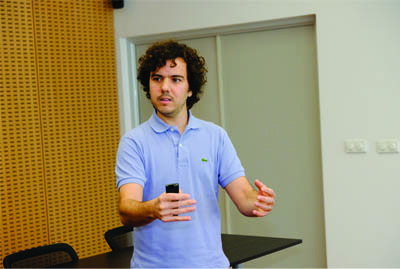PhD student from Universidad de Alcalá invited to give a talk on "Digital Communications for the Control of Modular Multilevel Converters" at CISTER
19, Mar, 2019
 Tomás Corrêa gave a talk on “Digital Communications for the Control of Modular Multilevel Converters” on the 19th of March, at CISTER/FEUP. Tomás is a PhD student at the Universidad de Alcalá de Henares in Spain and started by explaining the concept of Modular Multilevel Converter (MMC) and how it impacted the conversion and control of electrical energy at high voltage levels. MMCs, invented in 2001, are composed of a potentially large number of power modules, as known as cells, that are stacked and switched on and off individually to generate a voltage wave with a desired shape, typically sinusoidal. The cells are controlled centrally but individual connections to the controller can limit scalability and hinder MMCs applicability. Thus, Tomas focused on the current trend toward using digital communications in MMCs and told us about the benefits and challenges this trend implies, particularly concerning the trade-off between latency, reliability and cost. Among different alternatives, Ethernet technology connected in a ring topology stands up, currently, as the best compromise essentially due to the high reliability-cost ratio and despite the relatively high latency it implies. Tomas shared with us, then, his research on Ethernet-based ring networks to bring latency to a minimum, designing specific protocols, namely TTRing and DiSortNet, for specific distributions of the MMC control, that reduce by one half the best latency achievable with current COTS technology, supporting 400 nodes with cycle times below 200us.
Tomás Corrêa gave a talk on “Digital Communications for the Control of Modular Multilevel Converters” on the 19th of March, at CISTER/FEUP. Tomás is a PhD student at the Universidad de Alcalá de Henares in Spain and started by explaining the concept of Modular Multilevel Converter (MMC) and how it impacted the conversion and control of electrical energy at high voltage levels. MMCs, invented in 2001, are composed of a potentially large number of power modules, as known as cells, that are stacked and switched on and off individually to generate a voltage wave with a desired shape, typically sinusoidal. The cells are controlled centrally but individual connections to the controller can limit scalability and hinder MMCs applicability. Thus, Tomas focused on the current trend toward using digital communications in MMCs and told us about the benefits and challenges this trend implies, particularly concerning the trade-off between latency, reliability and cost. Among different alternatives, Ethernet technology connected in a ring topology stands up, currently, as the best compromise essentially due to the high reliability-cost ratio and despite the relatively high latency it implies. Tomas shared with us, then, his research on Ethernet-based ring networks to bring latency to a minimum, designing specific protocols, namely TTRing and DiSortNet, for specific distributions of the MMC control, that reduce by one half the best latency achievable with current COTS technology, supporting 400 nodes with cycle times below 200us.
PHOTOS:
At CISTER's Facebook Page / At CISTER's Instagram Page

